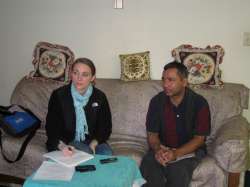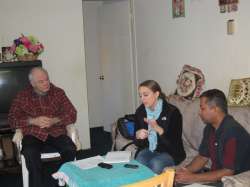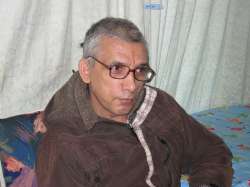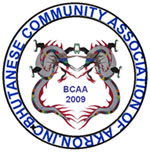|
||||||||
|
Gross National Happiness (GNH) has been a hallmark of the Bhutan
monarchy for many decades and the concept is garnering attention from governments, news agencies, as
well as the general public from around the world.
The concept seems to have been unique when first promulgated by Bhutan's King
Jigme Singye Wangchung in 1972. Bhutan is a tiny country with less than one million people, far fewer than at least nine cities in the United States and approximately 9% the size of New York City. It's agrarian economy, based on crops and livestock, supports 80% of the small population. Hydroelectirc power is Bhutan's largest export, yet a significant proportion of the population does not have electricity and depends on firewood for energy. Tourism is a major indusry for the country. Tourists have to pay hundreds of US dollars per day, which include hotel, a guide, and a driver. The guide and driver assure that tourists and visitors see very selected aspects of the country. Thus, Bhutan is an exclusive and expensive destination for visitors, which ensures the preservation of its culture and traditions, even as it eniches the monarchy. To the tens of thousands of Bhutanese refugees who were forced to flee their property, their animals, their livlihoods, and their homes, GNH has not been a happy policy for all. With little time to prepare, often berift of property papers and official citizenship documents, Lhotsampas in southern Bhutan were summarily threatened and bullied out of their country. Many were tortured, raped, and imprisoned while some were murdered. Fear of such treatment was effective in getting tens of thousands of these citizens to leave "voluntarily." I have heard such stories from many different refugees in the Akron, Ohio area, and read countless similar stories on the Web. The Bhutan constitutional monarchy tries very hard to bury the past and live in a land that is "So Close to Heaven," even as it tries to get the world to forget the price that over 100,000 of its citizens have paid and continue to pay for the control it exerts over the country. It was with some curiosity and hope for more clarity and understanding about this exile that I answered my phone in December of 2011 to receive a call from Lisa Hazelton, a senior at Wooster College, who was working on her senior thesis, the topic of which was "Gross National Happiness." She had found me from the Webmaster link for www.bcakron.org. She asked if I could assist her in conducting interviews with some of the Bhutanese refugees in the Akron area. The College of Wooster's well-known reputation as a quality liberal arts institution, its commitment to seniors completing a thesis project, and the affinity I have for the Bhutanese refugees provided ample incentive for me to readily agree to help Lisa. |
||||||||
 Naresh Laoti Subba |
Her first interview was with Naresh Laoti Subba at the Pufferbelly Restaurant in Kent, Ohio. Dr. Subba spent about two hours telling his story of returning to his home in the south after completing a Bachelors degree at the only college in the country, located in Kanglung, Bhutan. After two days of journey by bus and one whole day by foot, he reached home to find not only his family had hurriedly left their home taking only personal essentials, but also learned that someone had forged his name on an official document testifying that he, too, had "willingly" left the country. Obviously, with no telephone or mail service in the county, he had no foreknowledge of this matter, but was told by the Bhutan police that the consequences would be dire if he stayed. He later found his family in exile in Nepal. Through faculty contacts at Tribhuvan University in Kathmandu, Nepal, he was able to enter the Physics program several years later at Kent State University, where he eventually earned a Ph. D. in 2010. | |||||||
|
|
||||||||
| The second interview took place on January 9, 2011 with Deo Narayan Dhungana and Durga Ghimirey in Mr. Ghimirey's apartment. The two of them related to Ms. Hazelton the ordeal that they and their families endured for 18 years, from before the time of their exile from Bhutan until they were given permission for resettlement in the United States of America. Below the pictures is a synopsis, based on an article by Nilam Ghimirey, of what they told her. | ||||||||
 Lisa Hazelton Durga Ghimirey |
 Terry Kuhn Lisa Hazelton Durga Ghimirey |
 Deo Narayan Dhungana |
||||||
|
Life in Bhutan When we were living in Bhutan we had farms, owned our own property, and were quite happy. Our families had been in Bhutan for many generations. Families lived together and several generations helped each other. We had plenty to eat and grew our own vegetables and livestock – mostly cows and buffalos for milk, goats for meat and milk, and chickens for eggs and meat. We felt settled and secure living our Nepalese culture (language, clothes, and religion) within the Bhutan monarchy which had a different language, clothes, and religion. We led happy, productive, and satisfying lives. We had no electricity or running water. Some hired the owner of an elephant to take us from our farm to get to the small towns because we had no boat to cross the river. Separation from Motherland In an ethnic cleansing in 1991 the Bhutan king and monarchy began a program that forced those of Nepalese descent to leave the country. Because the government was torturing some and destroying houses, we were fearful for our lives so we fled the country to find refuge in other countries. At first we went to India, but the Indian police put us in trucks and took us to the border of Nepal where we did not have anything to eat or anyplace to live. For several months people languished in this condition until the United Nations High Commissioner for Refugees established camps for us in Nepal. Life in the Camps In the camps living conditions were crowded and fires were common. Fires were especially bad because they could not be contained and often destroyed many huts and all of what little families had. The camps were dusty and hot, especially in the summer. Many people died in the camps from poor medical care, disease, and snake-bite. The thatched roofs often dripped rainwater inside the huts; other times when storms ranged, roofs would blow off. Mice, cockroaches, mosquitoes, and other bugs were a part of everyday life. Mosquito bites were common and lots of people got diseases from those bites. Some people did not have jackets in the winter time and just got cold, and when the rice rations ran out, we had to go hungry. If no family member had a job, then the only food was the rice rations; this meant that those people had no vegetables or meat to go with the rice. Some of the rice rations had a bad odor and all of it had stones, dirt, and bugs that had to be separated. As people left the camps, and in the aftermath of fires, looting and crime increased. These problems compounded the usual living conditions which consisted of bamboo huts for homes, no running water except for a community spigot three times a day, and no electricity. Life was primitive. Resettlement After we spent 18 years of our lives in refugee camps, the International Organization for Migration (IOM) and several countries offered us the possibility of resettlement into third countries such as the United States of America. It was a difficult choice because some refugees still wanted to wait for repatriation to Bhutan while others were ready to seek a new life, even in unknown circumstances. As negotiations between Bhutan and Nepal carried on over the years, the Bhutanese monarchy has been steadfast in refusing to negotiate or permit repatriation. Likewise, Nepal did not want to offer us refugees permission to become citizens of Nepal. Only when the United Nations intervened and offered the possibility of settling in other countries, did we refugees have a choice either to remain in the camps or to seek a new life elsewhere. The United States, with the help of the IOM, offered the possibility of resettlement to 60,000 of the Bhutanese refugees. By the summer of 2010, approximately 500 Bhutanese refugees were living in the greater Akron area. End of interview |
||||||||
|
I was very interested in learning about her
thesis project, but she did not send it as she said she would. I thought that she was probably busy
getting on with her life in the aftermath of graduating, so I called the
College of Wooster library, and was referred to the Alumni Office.
I was informed that senior theses were not available to anyone without
permission of the student who wrote it. I suggested that because
seniors leave the area and cease using their institutional email
addresses, that was an impractial barrier; however, I was told that was
the policy. So, on August 23, 2012 I
found some old notes with the phone number Lisa had given me almost two
years before, and dialed it. Lo and behold! She answered that number at
2:52 P. M. EDT. She readily agreed to call the College of Wooster and give
permission to Erika Viso for me to have access to her thesis, which is
in the Independent Study Database. I gave her Ms. Viso's telephone
number and she said that she would call right away after we hung up. Later on August 23, 2012 at 4:06 P. M. I
called
Erika Viso at the College of Wooster, who told me that Lisa
Hazelton had not called her and had not given permission to release her
thesis. As of September 24, 2012, I still had
not heard that Lisa gave her permission, so I am writing this page to
document the efforts that members of the Bhutanese Community
Association of Akron have made to illustrate aspects of Gross National
Happiness throughout the world. For whatever reasons, Lisa does not want her thesis shared with me or the Bhutanese refugee community. Her title is interesting: Beyond GNP: An Analysis of Individual Experiences with Gross National Happiness in Bhutan. It was completed in 2011 in the Department of Anthropology. The advisor was Setsuko Matsuzawa and there was an outside committee member, Kerry Skora, Associate Professor of Religious Studies from Hiram College. Professor Skora offers a course titled "Pilgrimate to Bhutan: Tradition & Development, Bhuddhist Wisdom and Gross national Happiness," which he took on at least one tour to Bhutan. In a discussion I had with him about Bhutan and the refugee experience, he gave little credence to their story and told me that if I wanted to learn about the "real" Bhutan, then I should read Barbara Crossette's book, So Close to Heaven. Ms. Crossette is a former New York Times correspondent. Unfortunately, for a reporter from such a prestigious news organization she made little effort to investigate claims of human rights abuses against the Bhutanese monarchy, with which she admits to having cordial and cozy relations. In fact, those negatively affected by the GNH policy consider it a clever concept created to hoodwink the international community in order to distract, divert, diffuse, and forge the refugee problem forever, and thus ensuring happiness to some of the ruling class and the monarchy for generations. The Bhutan government has been campaigning intensely and it has been widely successful in convincing many people, scholars, agencies and governments, especially in the West where people are relatively welll off and financial standing is good. However, the Bhutan government does not have many converts in the East where poverty reigns. Unfortunately, the Bhutanese diaspora has not done enough to convince people, scholars, agencies and governments that GNH is simply a ploy used to perpetuate and ensure the happiness of the ruling class by diverting the attention of citizen-stakeholders from the real issues that need immediate attention to regain unity, peaceful coexistence, rights, and freedom in the country. The following first-person account by a book reviewer gives a sense of the disappointment that Bhutanese refugees feel toward Crossette's book, So Close to Heaven: "Writers who paint one side of the coin are a bane to the world. Government records and things as they seem do not make a truth. No body, I repeat, nobody can write the true story about Bhutan if he/she has not been a Bhutanese for [their] entire life. Crossette does not know and will never know the atrocities perpetrated by the compassionate 'Buddhist King' of Bhutan. She will never know how my father was hung upside down and beaten for not being obedient to the compassionate King. She will never know the fear psychosis of the Bhutanese regime that is strangling itself. Bhutan, the land is beautiful and exotic otherwise I would not be wasting my time telling you it is. The captivating landscape and the mystic religion is a blanket under which tortures and rapes went on. Whlle some journalists and historians lost themselves in the myth of the oxymoron, 'democratic monarchy,' the other side would have blamed Barbara if she had been objective and sensitive to the facts. I blame her because I do not believe that a minority that is seized by fear of losing power is justified to kill...." Another possible explanation for Miss Hazelton's failure to follow up on her initial commitment and follow-up promises to share her thesis may be that she feels that her topic did not need to address the forced exile and refugee experience of over 120,000 of Bhutan's citizens because it only concerned the GNH policy and how it impacted those living in Bhutan at the time she was writing her senior thesis. If so, why not allow it to be read? In any case, it is a pity that scholars and refugees who have an interest in the topic are not permitted to read it. This refusal appears to contradict the scholarly tradition and open inquiry characteristic of university studies since Baruch Spinoza (1632-1677), John Locke (1632-1704), Sir Isaac Newton (1643-1727), and Voltaire (1694-1778) all of whom helped usher in the age of enlightenment; but, perhaps the refusal is in keeping with the isolationist culture of the country of Bhutan. |
||||||||
|
This article was written by Terry Kuhn, Nilam Ghimirey, and Naresh Laoti Subba. |
||||||||
| Opinion Page | ||||||||
|
Home |
||||||||
